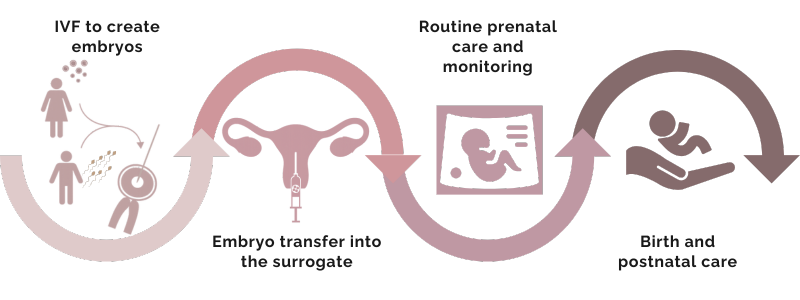Explore what surrogacy means, how it works, and why SurrogateFirst is the trusted guide through this life-changing journey.
Surrogacy Definition
Surrogacy is a process where a woman—called a surrogate—carries and delivers a baby for another person or couple, known as the intended parent(s). It offers a path to parenthood for people who are unable to conceive or carry a pregnancy themselves
Surrogacy Methods: Types of Surrogacy
There are two main types of surrogacy:
Traditional Surrogacy

Gestational Surrogacy

Read more in our guide to Types of Surrogacy.
What is the Difference Between IVF and Surrogacy?
IVF (In Vitro Fertilization) is a fertility treatment where an egg and sperm are combined in a lab and then implanted in a woman’s uterus—usually the intended mother.
Surrogacy involves IVF too, but the embryo is implanted in a surrogate who will carry the baby to term for the intended parents.
What Is a Surrogate Mother?
A surrogate mother is a woman who carries and delivers a baby for someone else. She undergoes medical screenings and psychological evaluations before being approved.
Definition Highlight: A surrogate mother is a medically approved and legally contracted woman who agrees to carry a child for intended parents.

Who Is Eligible to Be a Surrogate Mother?
While requirements can vary slightly, here are the basics:
- Age 21–40
- Must have had at least one healthy, full-term pregnancy
- No major complications in prior deliveries
- Healthy BMI
- Financial stability
- Non-smoker and drug-free lifestyle
A Short History of Surrogacy
Surrogacy has evolved from informal arrangements to structured, legal processes. The first successful gestational surrogacy occurred in 1985. Today, surrogacy is supported by medical advances like IVF and is legally recognized in many parts of the world.
Surrogacy Laws
Surrogacy laws vary widely. Some states and countries allow it with specific legal frameworks, while others prohibit it entirely. For example, California is known for its surrogacy-friendly environment, while Michigan bans compensated surrogacy.
Check out our detailed article to find our where surrogacy is legal.
Medical Surrogacy Process
The surrogacy process includes:

Surrogacy is highly regulated and supported by medical professionals every step of the way.
Who Is Surrogacy For?
Surrogacy can be an option for:
- Individuals with infertility
- LGBTQ+ couples
- Single parents by choice
- Anyone unable to safely carry a pregnancy
It provides hope for many who’ve struggled with other paths to parenthood.
Who Is Involved in the Surrogacy Process?

A successful surrogacy journey includes:
- Intended Parents
- Surrogate
- Fertility Specialists
- Surrogacy Agency
- Legal Counsel
- Case Managers and Coordinators
- Mental Health Professionals
Everyone plays a crucial role in supporting the process from start to finish.
How to Find a Surrogate
Intended parents can either take on the surrogacy process on their own or appoint an agency to support them.
Surrogacy agencies like SurrogateFirst handle screening, matching, and coordination. We help match you with the right surrogate for a smooth and emotionally supportive journey.
When parent choose to take on the process independently, they have to look after the same steps of the process, from finding a qualified surrogate to coordinating legal, medical, and psychological screenings, on their own.
While some intended parents explore this path to save on costs or work with someone they already know, it can be incredibly complex and time-consuming. Without professional support, you may face delays, legal risks, and emotional strain, especially when navigating screening protocols, legal contracts, and clinic coordination on your own.
Explore the full surrogacy process here
How Much does Surrogacy Cost?
Surrogacy in the U.S. typically costs between $100,000–$150,000, covering:
- Surrogate compensation
- Medical procedures
- Legal fees
- Agency support and case management
See our full cost breakdown here.
Surrogacy Risks
While rare, surrogacy can come with medical, legal, and emotional risks. These include potential pregnancy complications, mismatched expectations, or legal complexities. Agencies like SurrogateFirst are here to mitigate those risks through expert guidance.
Why SurrogateFirst?
At SurrogateFirst, we’re more than a matching agency—we’re your support system.
- Compassionate, personalized matching
- 24/7 access to dedicated case managers
- Legal and medical coordination
- Transparent pricing
- Emotional support for surrogates and for intended parents alike






